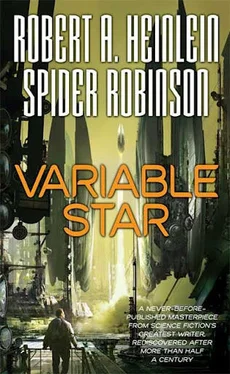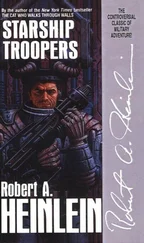Complicating the task, of course, the society was intended to become something utterly different at the end of that twenty years, and needed to be kept aimed in that direction at all times. For most humans, anything farther ahead than this time next year is the “far future.” It can be all too easy to lose sight of a goal that far off, and we had to be ready when we got there. The good news was that Merril Grossman was our Coordinator. She had a keen mind, a great understanding of her job, and a way of bullying people that was so transparently an act of love everyone let her get away with it.
Six months into the voyage, she organized and chaired the Sheffield ’s first town meeting. It had to be electronic, naturally. Any cubic large enough to have held all of us at once, even in free fall, would have been a preposterous waste of space, in a ship that never seemed to have enough. Even the Pool could barely have accommodated half of us, and only on the friendliest of terms. But a well-run ETM works better than a live rally in the park, and Coordinator Grossman knew how.
I mean, speeches were made, inevitably: we are talking about humans here. But they were kept short, and they assayed out remarkably low in bullshit content. Captain James Bean, a man who looked exactly like you want the captain of your starship to look, and had the reputation to back it up, got five minutes, and used three. The whole ship rocked with applause when he was done; he was well liked. Five-minute gab-slots also were awarded to Colony Governor Jaime Roberts, and to George R representing the Relativists. Another would have gone to Governor-General Lawrence Cott, representative of Kang/da Costa, but he was ill so his slot was given by his lifemate Perry Jarnell, who took six minutes. At that point his audio and video both cut out.
After that, even the most pompous speakers quickly figured out that if they hadn’t gotten it said within five minutes, Merril wasn’t going to let them keep trying. By the time everyone’s screens went dark that night we had accomplished what I considered an astonishing amount.
Names, for one thing.
People had been arguing them for months, occasionally at a volume that drew proctors, but somehow our Coordinator cut through the confusion in a way that didn’t seem to leave anyone feeling disenfranchised, and before too long we had all finally reached consensus on names for most of the places and things that would really matter to all of us when we got to Bravo.
I for one found most of the choices cheering, too—our colony seemed to be a jolly crew.
The three major continents, for example, were christened Samba, Cerveja, and Carnaval. What lay ahead we knew not, but we intended to have a good time there if we could. At the same time, once he’d explained it to everyone, Matty Jaymes’s suggested name for our first settlement, Saudade, passed by a landslide, with fewer than two dozen opposed, the closest to unanimity we came that night. We all understood that our good times would always, always be seasoned with a sharp regret, a longing for all the lost loved ones and planets and habitats we had left so far behind us forever. To pretend otherwise would be foolish.
Nearly as popular a choice were the new names given to our two moons. Nobody had liked the unimaginative names Immega had given them, New Deimos and New Phobos. For one thing, they didn’t look like their namesakes, and would not behave like them in the sky. For another, a lot of us were from Mars, and did not want our good times tinged with nostalgic regret every single damn time we looked at or discussed the night sky. (That was one reason the two closest alternatives to Saudade—Rio de Janeiro and Niteroi—had found so few supporters, I think.)
So I’d been expecting the grassroots effort to rename the moons. But the names chosen were a pleasant surprise, from the music of the twentieth century: Tom and Joao. The great composer Antonio Carlos Jobim, known as Tom, and his great disciple Joao Gilberto between them created samba, the lush basis of all subsequent Brazilian music… which became a major influence on the work of my favorite saxophonist of that period, Stan Getz. I took that as a good omen, and made a mental note to find out if Kathy knew his work with Tom and Joao. (She did—and knew a guitarist who could play Gilberto style. We killed ’em at the Horn of Plenty all that week.)
Governor-General Cott’s partner had by that point leaned on somebody hard enough to get hooked back online, and expressed his co-husband’s strong distaste, on behalf of our noble patrons at Kang/da Costa, for the growing tendency of some colonists to shorten the name of our new home-to-be from Brasil Novo to Bravo. His partner found it disrespectful and Jarnell found it vulgar, if I’ve sorted them out correctly. He stopped short of demanding prohibition of the name Bravo, but asked for a resolution agreeing that the proper name was Brasil Novo. The Brazilians aboard registered strong support.
Merril sighed and asked if anyone else wanted to address the question. A colonist named Robin Feeney spoke up, pointing out that “bravo” was a word used to applaud a feat of great difficulty, and a jump of eighty-five light-years certainly qualified: our successful arrival would itself be a Bravo to Captain Bean and his excellent crew. That went over well. The word was also, she added, one we commonly applied to artistic effort that moved us, and as an actress and painter, she hoped hearing it often might help to remind us that the arts would have an important place even in a frontier society. Someone promptly said, “Bravo!” and was widely echoed around the ship. Merril squelched further debate, put it to a vote, and that was the end of the Cott resolution. Many of us would continue to say Brasil Novo, most of the time, because let’s face it, it was more elegant. But when we did it was our choice.
More time was nearly wasted on the contentious question of just where on exactly which continent Saudade should be founded. It was a big planet. Almost none of us had an opinion, but the few who did were married to them. Fortunately before it got out of hand, Merril pointed out to us that the reason most of us had no opinion was that none of us was entitled to one. It was not yet possible to state with certainty where the best site for a colony might be: we simply didn’t know enough yet. Robot probes were good, but they weren’t that good. We would simply have to wait until we approached the Peekaboo System and could take a closer look for ourselves.
We did more than just pick names that night. Some sensible suggestions were made. Survivor Gerald Knave, for example, proposed we establish a prize of some kind for Most Constructive Complaint of the Month. Sol Short broke in to suggest we establish some sort of penalty for the least constructive, but Merril ruled him out of order and made it stick.
The most popular speaker of the evening was clearly the Zog. He spoke on what it was now believed our new home would be like , the local conditions we expected to find, some of the flora and fauna we knew about—not in any great detail, really: just enough to give a sense of the place. More than a few of us were still as ill-informed as I had once been, and all were spellbound by his descriptions. He made it sound exciting, enticing, mysterious. A steamy jungle planet, shrouded in mists, teeming with life as exotic as if it had been made up to entertain a child at bedtime. His description of the hoop snakes, which bit their own tails, curled up into the shape of a wheel, and then by deforming their belly muscles were able to roll along the trails carved through the jungle by the snipper beasts, had everyone chuckling. Then his straight-faced explication of the propulsive method used by the rocket slugs caused such a shipwide convulsion of laughter Merril had a hard time restoring order. For months thereafter, the words “green mist” had the power to make us crack up. I remember thinking at the time that it was the first time the entire colony had laughed together about something, and that I hoped it wouldn’t be the last.
Читать дальше










